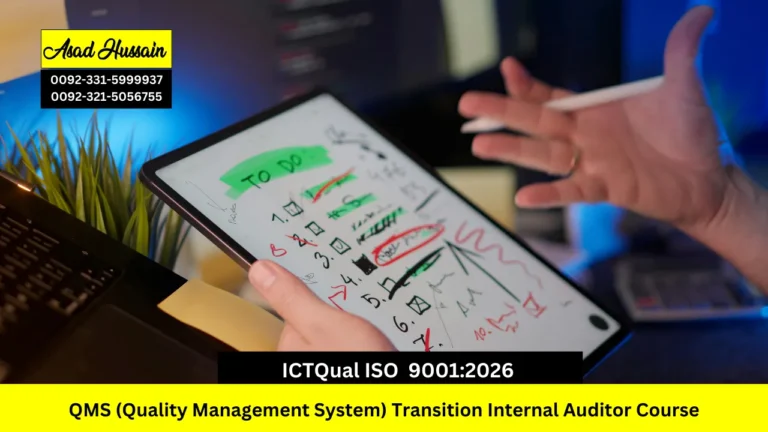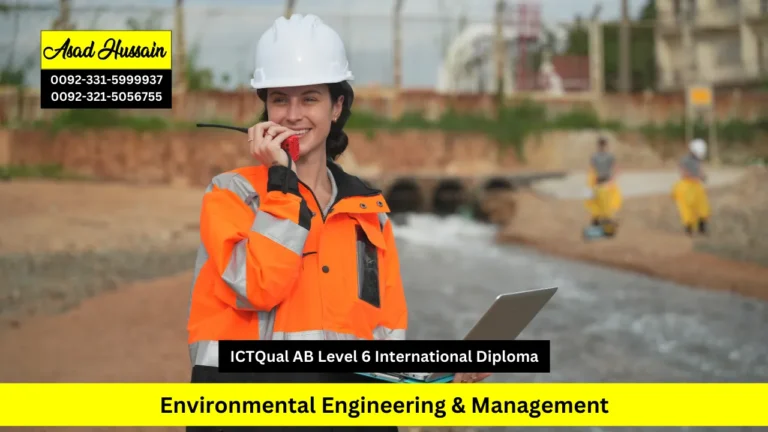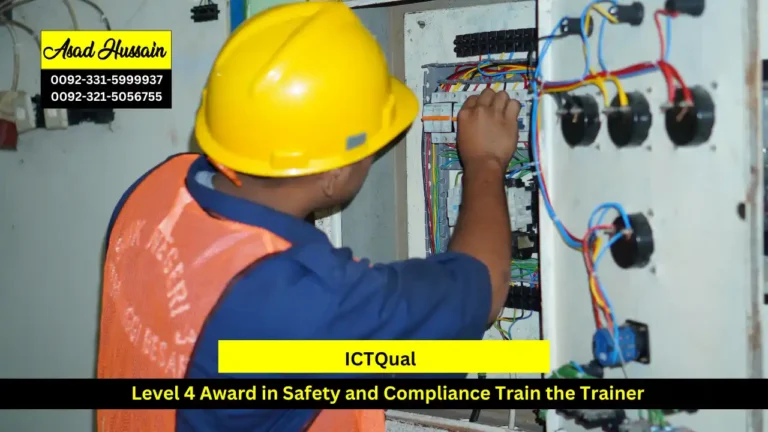The ICTQual International Level 4 Diploma in Airport, Airline and Aviation Management is a globally recognized qualification designed for learners who aspire to take on leadership and management roles within the aviation industry. Building on the foundations of Levels 2 and 3, this diploma provides a comprehensive understanding of advanced airport operations, airline management, strategic planning, and regulatory frameworks that ensure the smooth and safe functioning of aviation organizations worldwide.
This program equips learners with both theoretical knowledge and practical skills in areas such as airport systems, airline scheduling, aviation safety management, passenger service excellence, and resource planning. In addition, students develop essential leadership, communication, and decision-making skills, which are critical for managing teams and operations in a fast-paced, global aviation environment.
The diploma is ideal for students, job seekers, and professionals who want to progress into supervisory or managerial positions in airlines, airports, and aviation support services. It also serves as a pathway to higher-level qualifications, including advanced diplomas and degrees in aviation and management.
With its international recognition, the ICTQual Level 4 Diploma not only enhances employability but also prepares learners to meet the growing global demand for skilled aviation managers. Whether you are starting your career, advancing from earlier qualifications, or transitioning from another industry, this diploma provides the knowledge and confidence to thrive in one of the world’s most dynamic sectors.
Program Highlights
Mandatory Units
This qualification, the ICTQual International Level 4 Diploma in Airport, Airline and Aviation Management, consists of 6 mandatory units.
- Global Aviation Industry and Regulatory Frameworks
- Airline Operations and Network Planning
- Airport Commercial Development and Management
- Aviation Safety Systems and Quality Assurance
- Human Resource Management in Aviation
- Financial and Strategic Planning in Aviation
Entry Requirements for ICTQual International Level 4 Diploma in Airport, Airline and Aviation Management
Age Requirement
- Learners must be at least 18 years old at the time of enrollment
- Open to both young adults and mature learners aiming for management-level aviation careers
- No maximum age limit, ensuring accessibility for learners of all backgrounds
Educational Background
- Completion of secondary school education (or equivalent) is required
- Learners who have successfully completed the ICTQual Level 3 Certificate or Diploma in Airport, Airline, or Aviation Management (or an equivalent qualification) are strongly encouraged to apply
- Students with a background in business, travel, tourism, or hospitality may also be considered
Work Experience
- Work experience is not mandatory, but prior exposure to aviation, travel, or customer service roles will be an advantage
- Candidates with supervisory or operational experience in related industries may find the course particularly beneficial
Language Competence
- A good command of spoken and written English is essential, as the course is delivered in English
- Learners should be able to communicate effectively in academic and professional contexts
- Some providers may require English proficiency evidence (such as IELTS or equivalent) for non-native speakers
Technical Requirements (for online learners)
- Access to a computer or laptop with internet connectivity
- Basic computer literacy to engage with online learning platforms and digital resources
Learning Outcomes for the ICTQual International Level 4 Diploma in Airport, Airline and Aviation Management:
Global Aviation Industry and Regulatory Frameworks
By the end of this unit, learners will be able to:
- Analyse the structure and scope of the global aviation industry, including key stakeholders and market dynamics.
- Identify major international regulatory bodies (e.g., ICAO, IATA, EASA) and their roles in aviation governance.
- Evaluate the impact of global aviation policies and treaties on airline and airport operations.
- Demonstrate understanding of compliance requirements across jurisdictions and operational contexts.
- Assess the influence of geopolitical, environmental, and economic factors on aviation regulation.
- Explain the role of national civil aviation authorities and their relationship with global regulators.
- Apply regulatory knowledge to operational decision‑making and strategic planning.
- Understand emerging trends in aviation law, sustainability, and global mobility.
Airline Operations and Network Planning
By the end of this unit, learners will be able to:
- Explain the principles of airline network design, route development, and fleet allocation.
- Analyse factors influencing hub‑and‑spoke versus point‑to‑point models.
- Evaluate the role of scheduling, codeshare agreements, and alliances in network optimisation.
- Demonstrate understanding of operational planning, crew rostering, and aircraft utilisation.
- Assess the impact of market demand, competition, and regulatory constraints on network planning.
- Apply strategic thinking to route profitability and expansion decisions.
- Understand the integration of cargo and passenger operations within airline networks.
- Use data and forecasting tools to support network planning decisions.
Airport Commercial Development and Management
By the end of this unit, learners will be able to:
- Analyse the commercial functions of airports, including retail, concessions, and property development.
- Evaluate strategies for revenue generation beyond aeronautical services.
- Demonstrate understanding of passenger segmentation and commercial targeting.
- Assess the role of branding, partnerships, and customer experience in airport profitability.
- Explain the principles of terminal design and space optimisation for commercial use.
- Understand the balance between operational efficiency and commercial growth.
- Apply knowledge of stakeholder management in airport development projects.
- Explore trends in airport privatisation, investment, and public‑private partnerships.
Aviation Safety Systems and Quality Assurance
By the end of this unit, learners will be able to:
- Explain the components and structure of aviation safety management systems (SMS).
- Analyse the role of safety audits, inspections, and continuous improvement processes.
- Demonstrate understanding of risk assessment, hazard identification, and incident reporting.
- Evaluate the integration of safety and quality assurance in operational environments.
- Apply safety principles to emergency planning and crisis response.
- Understand the importance of safety culture and leadership in aviation organisations.
- Assess the impact of regulatory compliance on safety performance.
- Use performance indicators and data analytics to monitor safety outcomes.
Human Resource Management in Aviation
By the end of this unit, learners will be able to:
- Analyse HR functions in aviation, including recruitment, training, and performance management.
- Evaluate the impact of organisational culture, diversity, and inclusion on team effectiveness.
- Demonstrate understanding of workforce planning and succession strategies.
- Assess the role of leadership development and employee engagement in aviation settings.
- Apply HR principles to conflict resolution, disciplinary procedures, and staff wellbeing.
- Understand regulatory requirements related to aviation HR practices.
- Explore trends in automation, outsourcing, and remote work in aviation HR.
- Use HR metrics and analytics to support strategic decision‑making.
Financial and Strategic Planning in Aviation
By the end of this unit, learners will be able to:
- Explain the fundamentals of aviation finance, including budgeting, forecasting, and cost control.
- Analyse financial statements and performance indicators relevant to airlines and airports.
- Evaluate investment decisions, capital projects, and funding sources in aviation.
- Demonstrate understanding of strategic planning models and tools.
- Assess the impact of financial planning on operational efficiency and competitiveness.
- Apply strategic thinking to market positioning, growth, and risk management.
- Understand the role of financial regulation and compliance in aviation.
- Use scenario planning and data analysis to inform strategic choices.
The ICTQual International Level 4 Diploma in Airport, Airline and Aviation Management is designed for learners who want to progress into supervisory, leadership, and management roles within the aviation industry. This diploma is ideal for students, job seekers, career changers, and professionals who are passionate about aviation and want to gain a globally recognized qualification that enhances employability and career growth.
1. Students and Higher Education Learners
- Students who have completed secondary education and want to specialize in aviation
- Learners progressing from Level 2 or Level 3 aviation qualifications
- Young learners aiming for advanced studies in aviation management
- Students seeking a globally recognized qualification to boost employability
- Those preparing for higher-level aviation diplomas or degrees
- Individuals passionate about aviation and eager to gain structured knowledge
2. Aspiring Airline and Airport Professionals
- Candidates preparing for supervisory or managerial roles in airlines or airports
- Learners aiming to understand advanced aviation safety and compliance
- Individuals who want to specialize in airport terminal or airline operations
- Those interested in passenger service excellence and customer experience
- People seeking international career opportunities in aviation management
- Beginners who want to transition into professional aviation leadership roles
3. Travel and Tourism Learners
- Students enrolled in travel and tourism programs who want to expand into aviation
- Learners aiming to combine tourism knowledge with airline and airport operations
- Individuals preparing for careers in ticketing, reservations, or travel consultancy
- Tourism students seeking a competitive edge in the global job market
- Professionals in hospitality who want to diversify into aviation services
- Learners interested in international travel and aviation careers
4. Job Seekers and Career Starters
- Individuals looking for their first professional role in aviation management
- Job seekers aiming to strengthen their CV with a recognized qualification
- Candidates preparing for airline or airport recruitment processes
- Learners seeking practical skills for supervisory or customer-facing roles
- People interested in working in fast-paced airport environments
- Those eager to join one of the world’s fastest-growing industries
5. Career Changers
- Professionals from hospitality, logistics, or customer service moving into aviation
- Individuals with transferable skills who want to re-skill for aviation careers
- Workers seeking a new career path in a dynamic and global industry
- Mid-career professionals aiming to progress into aviation management
- People passionate about aviation but lacking formal qualifications
- Learners exploring aviation as a second career option
6. International Learners
- Students from around the world seeking a globally recognized qualification
- Learners aiming to work with international airlines and airports
- Expats preparing for aviation roles abroad
- Candidates interested in cross-cultural airline and airport operations
- Individuals seeking a qualification accepted by global aviation employers
- Learners wanting to understand international aviation standards
7. Aviation Enthusiasts and Future Leaders
- Individuals passionate about aviation who want to formalize their knowledge
- Learners curious about how airports and airlines are managed at a higher level
- People interested in aviation safety, compliance, and passenger experience
- Enthusiasts preparing for advanced aviation studies or management diplomas
- Those who dream of leadership roles in airlines or airports
- Learners motivated to turn their passion into a professional aviation career







